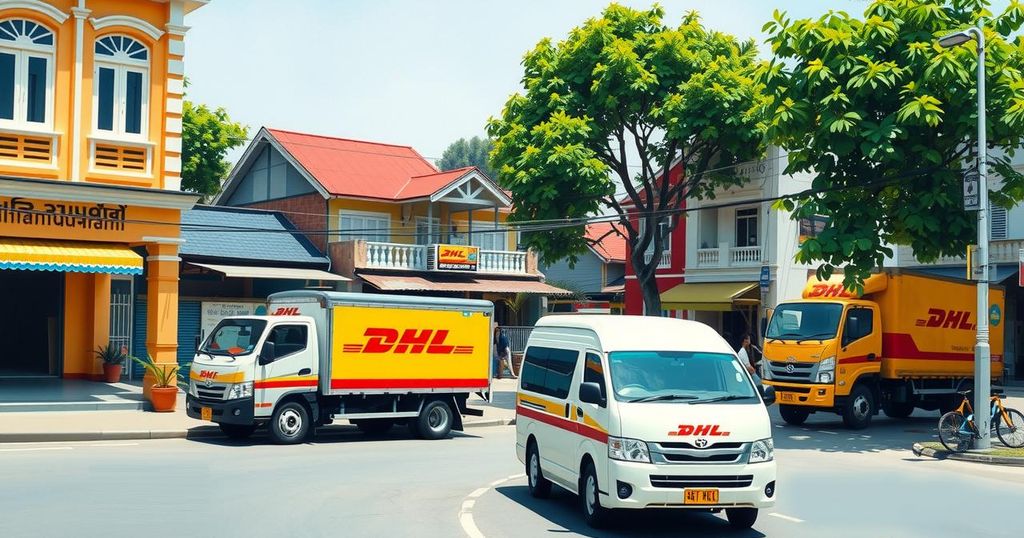DHL’s Strategy 2030: Strengthening Thailand as a Logistics Hub

DHL has announced its Strategy 2030 to enhance its operations in Thailand, positioning the country as a vital logistics hub. The strategy addresses key economic trends, including Global Trade, E-Commerce, and Sustainability. DHL aims to leverage Thailand’s manufacturing strengths and support its burgeoning e-commerce sector while committing to sustainable practices and extensive infrastructure investments.
DHL, the premier logistics provider globally, has announced its commitment to bolstering operations in Thailand through its Strategy 2030 – Accelerate Sustainable Growth. This strategy aims to position Thailand as a critical regional hub amidst the rising demand for supply chain resilience across the Asia Pacific. All four divisions of DHL are operational in Thailand, allowing local businesses to benefit from a unified logistics partner and access to DHL’s international network.
DHL’s Strategy 2030 focuses on five key megatrends impacting Thailand’s economy: Global Trade, E-Commerce, Sustainability, Digitalization, and an Evolving Workforce. These trends present unique challenges; however, DHL’s extensive experience and global presence afford it the flexibility to capitalize on emerging growth opportunities. Additionally, other growth initiatives are central to DHL’s plans for Thailand.
Geographic growth opportunities are paramount for DHL, particularly as trade lanes evolve and global supply chains diversify. While neighboring countries like Vietnam and Indonesia attract attention, Thailand’s established manufacturing prowess, especially in automotive and electronics, is a noteworthy advantage. As reported, the Ministry of Commerce projected a 5.4% growth in exports for 2024, a notable achievement in Thailand’s economic evolution.
In the energy sector, DHL sees potential for Thailand to emerge as a significant destination for electric vehicle (EV) production, largely influenced by government initiatives welcoming foreign manufacturers. DHL is positioned to support this transformation by providing specialized logistics services to facilitate the production of EVs, with a regional goal for EVs to constitute 30% of all vehicle production by 2030.
With the Thai e-commerce sector rapidly growing, DHL plays a fundamental role in supporting the extensive small and medium-sized enterprises (SMEs) contributing to Thailand’s economy. Projections indicate the market value of e-commerce will soar from $26.5 billion in 2023 to $32 billion in 2025, suggesting an annual growth rate of approximately 10%. DHL’s logistics solutions empower Thai brands to compete internationally, as evident in successful case studies like Gentlewoman and Fairtex.
DHL’s initiatives, including the GoTrade program, reinforce the company’s dedication to SME capacity building. Collaborating with government bodies, this initiative assists over 9,000 SMEs globally in navigating international markets. Concurrently, DHL eCommerce provides robust delivery solutions to facilitate market entry for e-retailers and brands in Thailand, ensuring affordability and reliability in services.
DHL’s sustained commitment to Thailand is evident through its extensive workforce of over 9,300 employees and substantial investments in logistics infrastructure. Managing over 678,000 sqm of warehouse space across more than 70 facilities, including sites in the Eastern Economic Corridor, DHL’s efficient operations involve approximately 4,800 vehicle loads daily.
In addition, DHL Express maintains a comprehensive aviation and ground operations network, with one regional hub at Suvarnabhumi Airport and 85 dedicated flights weekly. The company is also enhancing its sustainability efforts, with investments poised to increase its electric vehicle fleet by 300% over the next three years.
DHL Global Forwarding delivers air, ocean, rail, and road freight services across Thailand, serving over 2,000 clients through several offices and warehouses. Initiatives such as the new DHL International Multimodal Hub are facilitating smoother logistics and customs processes, thus reinforcing Thailand’s trade positioning while improving connectivity for landlocked regions such as Laos.
As a leader in sustainable logistics, DHL aspires to reach net-zero greenhouse gas emissions by 2050. The company has made strides in fleet electrification, becoming the first international express logistics provider to utilize e-bikes and EVs in Thailand, achieving a 21% electrification rate.
DHL Supply Chain is fortifying its sustainable practices through collaborations with various sectors, deploying over 30 electric vehicles during the implementation of the Certified GoGreen Specialist program. This structure assists in training employees on environmental best practices and developing renewable energy warehouses, with plans for Thailand’s first in 2025.
In terms of road freight, DHL Global Forwarding optimizes logistics through multimodal transport and electric vehicle use, with an expected reduction of 85,000 kilograms of CO2 emissions annually. Furthermore, DHL eCommerce plans to enhance its operations with the introduction of electric linehaul trucks and aims to transition 50% of its Bangkok last-mile fleet to EVs within two years, reflecting a commitment to sustainable logistics solutions.
DHL’s Strategy 2030 signifies a robust commitment to enhancing Thailand’s logistics landscape amidst evolving global trade dynamics. By addressing key megatrends and focusing on sustainable practices, DHL is well-positioned to facilitate regional growth, support SMEs, and further establish Thailand as a logistics hub. Their ongoing investments and innovative solutions in e-commerce and electrification demonstrate a proactive approach to meeting future challenges in the logistics sector.
Original Source: www.retailnews.asia




